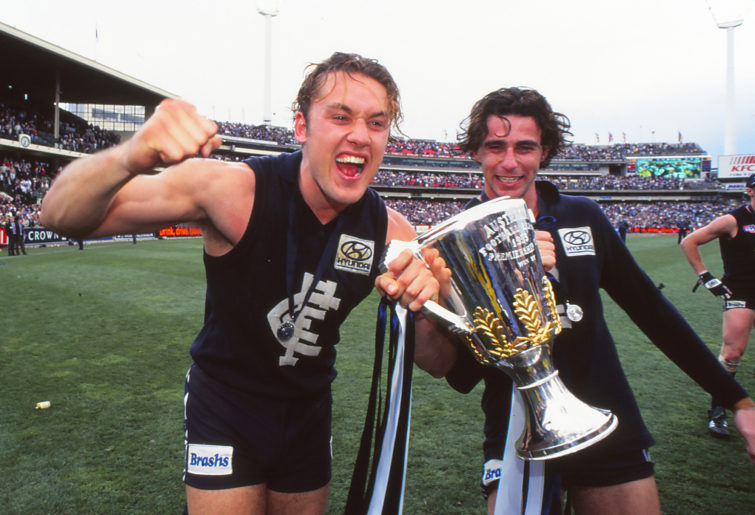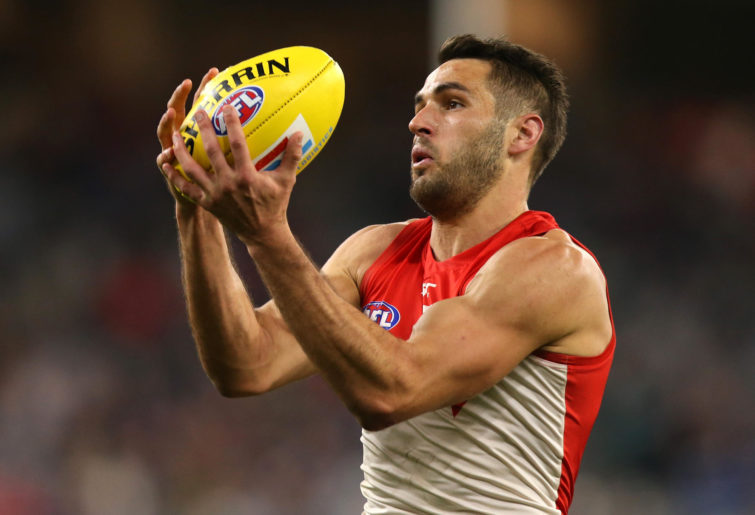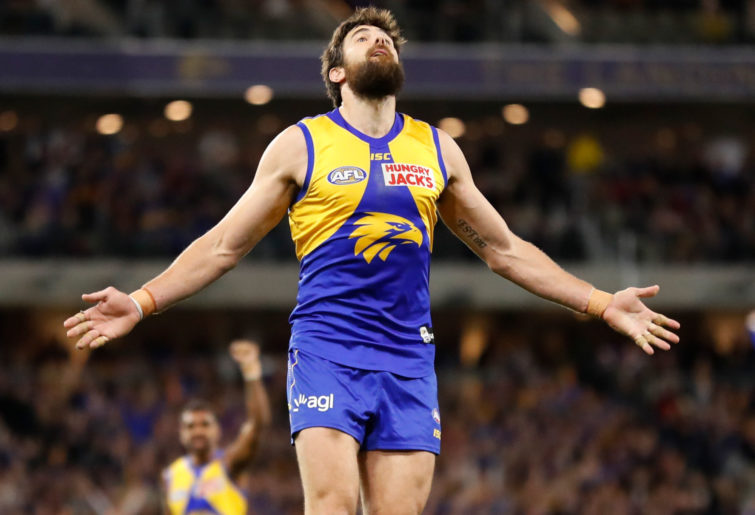Footy Fix: Ross Lyon is the AFL's most boring coach once again - and it's suffocating the Saints' season
On the scoreboard, it looks like a creditable St Kilda performance. A loss to a Port Adelaide outfit many see as a premiership contender…
Opinion
Up next is the K team, with three generations of one family all finding a spot in the squad.
John Kennedy Sr (Hawthorn 1950-59)
164 games, 29 goals
Although he is understandably best known as a coach – don’t think, do! – John Kennedy’s playing career was every bit as auspicious. In his first season with Hawthorn he won the best and fairest award, something he would repeat on three further occasions throughout the decade. Kennedy was a team-oriented ruckman who could rest in the back pocket and represented the VFL throughout his career. Captaining Hawthorn from 1955-59, he stepped straight into coaching after retirement and led the Hawks to their first premiership in 1961. Kennedy was recently elevated to be a Hall of Fame Legend.
Matthew Kennedy (Brisbane 1990-2001)
188 games, 30 goals
A talented utility who was most often stationed in defence, Matthew Kennedy played with Southport in the QAFL before moving up to the AFL with Brisbane. With good ball sense and a strong kick, he could play around the ground or as a backup ruckman with equal skill. Kennedy was one of only nine players to reach 100 games for the Brisbane Bears before the Fitzroy merge, and he finished third in the Lions best and fairest in 1997. He represented Queensland and the Allies in State of Origin matches through the 1990s and retired after the 2001 season. He was the player dropped after the preliminary final to make way for Alistair Lynch.
David King (North Melbourne 1994-2004)
241 games, 145 goals
David King was a hard-running part of the strong North Melbourne sides of the late 1990s, twice making it to the All Australian team in the back pocket. He could take a turn on the ball or deliver the ball with precision coming out of defence. King represented Victoria in three straight years from 1997 and played in both the 1996 and 1999 premierships. Notably in each of his first seven years North Melbourne reached the preliminary final, a record that has yet to be broken. King retired after the 2004 season and was named as an emergency in North Melbourne’s team of the century.
Merv Keane (Richmond 1972-84)
238 games, 36 goals
While never one for plaudits or big awards, Merv Keane was an integral part of Richmond’s success through the 1970s and 80s. Highly disciplined and a strong mark, Keane played in the 1973, 1974 and 1980 premierships – the last as a ruck rover – as well as featuring in the 1982 grand final. He represented Victoria on two occasions and was awarded life membership of Richmond in 1981. After departing the Tigers, he played at Sturt for one season and coached for three more before coaching at under-18s level through the 1980s and 1990s. Keane was named on the halfback flank of Richmond’s team of the century.
Anthony Koutoufides (Carlton 1992-2007)
278 games, 226 goals
The prototypical athlete footballer, Anthony Koutoufides was a drawcard for Carlton throughout his career even as injury dulled his brilliance towards the end. Kouta, as he was universally known, was powerful and a strong mark with good skills and an ability to play anywhere on the field. He is most remembered for his heroics in the last quarter of the 1999 preliminary final and his world-beating play throughout 2000. Koutoufides won club best and fairest awards in 2001 and 2005, led the club’s goal kicking in 1997, captained the club from 2004-06 and was a key part of the 1995 premiership. He was named in the Greek team of the century and the Italian team of the century and was inducted into the Australian Football Hall of Fame in 2014.
Peter Knights (Hawthorn 1969-85)
264 games, 201 goals
Peter Knights is one of the most famous aerialists in league history. Rarely would a match pass without Knights leaping high into the air to intercept an attack or to launch one of his own. His early career saw him thrown around the field, even deputising at full-forward after Peter Hudson’s 1972 injury, and leading the club goal kicking before settling into defence. Knights won two best and fairest awards and played in the premiership sides of 1976, 1978 and 1983. Twice he was runner-up in the Brownlow Medal, once by only three votes after missing seven matches through injury. Knights is an official Hawthorn legend and was named on the halfback flank of the club’s team of the century.

Anthony Koutoufides. (Photo by Getty Images)
Daniel Kerr (West Coast 2001-13)
220 games, 122 goals
Daniel Kerr was a dynamic and hard-running part of the star-studded Eagles midfield of the mid-2000s. Physically tough and with a strength that belied his size, Kerr was able to provide drive off halfback or kick a handy goal when needed. He played in West Coast’s 2006 flag and twice was runner-up in the Brownlow Medal along with third once. Kerr won the goal of the year in 2003 after running nearly the length of the field and kicking truly from 48 metres and was named the AFLPA best first-year player in 2001. The second half of his career was marred by injury, but he played 24 matches in 2012 to remind the football world of his consistent quality.
Paul Kelly (Sydney 1990-2002)
234 games, 200 goals
The Sydney Swans of the 1990s battled back from irrelevance to a grand final and regular finals appearances in no small part thanks to the leadership of Paul Kelly. Named club captain in 1993, he held the role until his retirement in 2002. Unflinchingly tough and brave as a matter of course, he was known among Swans faithful as Captain Courageous. Kelly had star quality as a footballer as well, winning the Brownlow Medal in 1995 and four club best and fairest awards. He was named as vice-captain and in the forward pocket of Sydney’s team of the century.
Laurie Kerr (Carlton 1950-59)
149 games, 48 goals
Laurie Kerr was a bright light for Carlton during a dim decade. With pace to burn and unlimited courage and aggression, he would run all day and intimidate his smaller opponents before wearing them down physically. In 1952 he represented Victoria, and he was named as club vice-captain from 1956-58. Upon retirement Kerr was a revered figure behind the scenes at Princes Park, and he had three sons and a grandson who would all represent Carlton’s various teams – Peter, 1967-70; Mark, 69 games for the reserves; Stephen, one season for the under-19s; Patrick, four games in 2018). Kerr was named as an emergency in Carlton’s team of the century.
Josh Kennedy (Hawthorn 2008-09, Sydney 2010-)
251 games, 150 goals
The third member of the Kennedy dynasty, Josh Kennedy was unable to break into the Hawthorn side with any regularity but became a star at Sydney. A nuggety and hard-at-it midfielder, Kennedy has been one of the league’s clearance specialists for the past decade. He was a member of the Swans 2012 premiership and has won club best and fairest awards in 2012, 2015 and 2016. In 2017 Kennedy was named as captain of the club and retains that role in 2020. He has been a consistent vote-getter in the Brownlow Medal, finishing third in 2014 and 2017.
Dean Kemp (West Coast 1990-2001)
243 games, 117 goals
Dean Kemp was an unmistakable part of the great West Coast sides of the 1990s as a tough and skilled midfielder who was able to distribute the ball to outside runners very effectively. Kemp won premierships in 1992 and 1994, being named club best and fairest in the first of these and winning the Norm Smith Medal in the second. Towards the end of his career he started to suffer from concussion issues, leading to his retirement in 2001 after he had been named co-captain. In 2006 Kemp was named in the centre of West Coast’s 20th anniversary team.

Josh Kennedy. (Photo by Paul Kane/Getty Images)
Trevor Keogh (Carlton 1970-81)
208 games, 191 goals
A wily and skilled member of Carlton’s ‘mosquito fleet’, Trevor Keogh played as a rover, wingman and half-forward throughout his career, winning the 1972 premiership in the latter role. Developing further into the midfield as his career progressed, Keogh represented Victoria in 1976 and 1978, also representing Victoria in those same years. In 1979 he was influential in the Blues’ flag – he knocked out Russell Ohlson, who had been a prime Collingwood player to that point – before injury took hold through 1980 and 1981. Keogh retired having won the Carlton reserves best and fairest in 1981, and he was named on the bench in the club’s team of the century.
Stephen Kernahan (Carlton 1986-97)
251 games, 738 goals
For all but one season of his VFL career Stephen Kernahan strode onto the field with the (c) beside his name. As Carlton’s longest-serving captain and all-time leading goal kicker, having led the club in each year barring his last, Kernahan was the Blues’ talisman. A strong mark and accurate if unconventional kick, he led the Blues to the 1987 and 1995 premierships and won best and fairest awards in 1987, 1989 and 1992. Although chased by Adelaide on their entry into the AFL in 1991, Kernahan stayed with Carlton through to the end of his career. In 2014 he was named as the second greatest Carlton player of all time and was named as centre half-forward and captain of the Blues team of the century. Just don’t ask him to sing…
James Kelly (Geelong 2002-15, Essendon 2016-17)
313 games, 90 goals
A skilful midfielder with unbound courage, James Kelly was one of 12 players to take part in all three of Geelong’s premierships in 2007, 2009 and 2011. While he never won a club best and fairest award, he was regularly prominent in the counting. Kelly was named All Australian in 2011 and won the Jim Stynes Medal that year in the International Rules series. After the 2015 season he left Geelong, ostensibly to retire, but was lured back to assist Essendon as a top-up player for two seasons.
Phil Krakouer (North Melbourne 1982-89, Footscray 1991)
148 games, 231 goals
Together with his brother Jim, Phil Krakouer lit up the VFL throughout the 1980s with their skill and electric pace. Phil was less immediately dynamic and more even-tempered, so much so that at the time even his brother Jim would say that Phil would be the better player in the long term. Krakouer led North Melbourne’s goal kicking on three occasions before transferring to Footscray in the 1990 midseason draft.
Josh Kennedy (Carlton 2006-07, West Coast 2008-)
248 games, 617 goals
In his first two years at Carlton Josh Kennedy was an ungainly centre half-forward who struggled in a poor side. Once he moved to West Coast as part of the trade for Chris Judd he became a focal point for the Eagles, and he remains so even with injury taking a greater hold of his body in recent years. A powerful mark and accurate kick, Kennedy has led West Coast’s goal kicking on six occasions, including Coleman Medals in 2015 and 2016. He kicked three goals in West Coast’s 2018 premiership win and has been named All Australian three times. Kennedy holds the record for most goals kicked for the West Coast Eagles.
Jim Krakouer (North Melbourne 1982-89, St Kilda 1990-91)
147 games, 236 goals
Unlike his brother Phil, Jim Krakouer was more eye-catching and attained more individual awards. Extremely brave and noted for occasionally losing his temper, Krakouer led North’s goal kicking three times, sharing the award with Phil in 1983, and won a club best and fairest in 1986. He represented Western Australia in 1979, 1981, 1985 and 1987, winning the Simpson Medal in 1981. Krakouer was named on the interchange bench in North Melbourne’s team of the century and in the forward pocket of the Indigenous team of the century.

Josh Kennedy. (Photo by Michael Willson/AFL Photos via Getty Images)
Brett Kirk (Sydney 1999-2010)
241 games, 96 goals
Brett Kirk started his career as an inconsistent onballer, but once Paul Roos was appointed as coach he didn’t miss a match up until retirement. He was cast into the role of tagger, often nullifying the opposition’s best ball winner and being able to pick up some quality possessions of his own. Kirk was named All Australian in 2004 and won best and fairest awards in 2005 and 2007. As captain of the side from 2005 until his retirement in 2010 he was instrumental in Sydney developing the Bloods culture that was pivotal in the club’s success, including the 2005 premiership. Kirk now lends his name to the medal won by the player judged best on ground in the Sydney derbies.
Peter Keenan (Melbourne 1970-75, 1981-82, North Melbourne 1976-78, Essendon 1979-80)
213 games, 123 goals
Best known as Crackers, the sight of Peter Keenan pawing at the ground to intimidate opposing ruckmen was a common one in the 1970s. A talented player with a strong mark, Keenan was lured to North Melbourne by the prospect of playing under Ron Barassi and was rewarded when he was the starting ruckman in the club’s 1977 premiership. Stints at Essendon and a return to Melbourne under Barassi again followed before he retired at the end of 1982. Keenan was never one to shy away from confrontation on and off the field, and it was natural that he proceeded into the media once his career was over.
Matthew Knights (Richmond 1988-2002)
279 games, 141 goals
A solid and dependable centreman for Richmond for over a decade, Matthew Knights went where the ball was and often made good use of it. His greatest performance came in the 1995 semi-final when he single-handedly kept the Tigers within reach of Essendon before they broke clear in the second half. Knights is the youngest player ever to win the best and fairest award at Richmond, winning in 1990 at 19 and following with another award in 1992. He captained Richmond from 1997 to 2000 and retired when injury meant he could not maintain his regular high standard. Knights was named on the interchange bench of Richmond’s team of the century.
John Kennedy Jr (Hawthorn 1979-91)
241 games, 210 goals
The final member of the Kennedy family to make this team, John Kennedy Jr followed in his father’s footsteps by becoming a vital part of the Hawthorn side for over a decade. As a classic utility he was tough and determined, while with a good burst of pace he could break free to kick some important goals. Kennedy played in four Hawthorn premierships, retiring after he missed out on the 1991 flag. He represented Victoria in 1984 and was named on the halfback flank of the Italian team of the century, qualifying through his maternal grandmother.
Justin Koschitzke (St Kilda 2001-13)
200 games, 247 goals
Justin Koschitzke ultimately had somewhat of an unfulfilled career, but when he was on the field he was a vital part of St Kilda’s spine. Able to play in any key position, Koschitzke won the Rising Star award in 2001 as a centre halfback and moved forward following Fraser Gehrig’s retirement to form a potent double team with Nick Riewoldt. Although injury and concussion shorted some seasons, Koschitzke played in the 2009 and 2010 grand finals and made history as the first player to kick an AFL goal outside Australia in 2013.
Tadhg Kennelly (Sydney 2001-11)
197 games, 30 goals
One of the first Irish stars of the competition, Tadhg Kennelly was a dashing halfback flanker who was a point of flair in the disciplined Swans sides of the era. In 2002 Kennelly received a Rising Star nomination, while in 2004 he was second in the league for rebounds from defensive 50. In 2005 Kennelly became the first Irish player to win an AFL premiership, dancing an impromptu jig on the podium when he received his medal. Injury started to affect him in 2007 and 2008, and in 2009 Kennelly returned to Ireland to win an All Ireland Senior Football Championship with Kerry. Having achieved this, Kennelly returned to Sydney for two more seasons before retiring.
Ron Kingston (Collingwood 1950-59)
173 games, seven goals
A devoted and disciplined defender for Collingwood, Ron Kingston was adept at reading the play and intercepting opposing forays. As part of the fabled Lucas-Kingston-Tuck halfback line for Collingwood, he played in the 1952, 1955 and 1956 grand finals as well as the 1953 premiership. Kingston would have also played in the 1958 flag but for injury. Noted as an on-field leader, Kingston never held any official role or won any recognition beyond playing for Victoria in 1957, but he was greatly valued at Victoria Park before crossing to Tasmania once his VFL career was over.
The L team is up next, with two extremely strong double acts in the key forward positions to choose from.